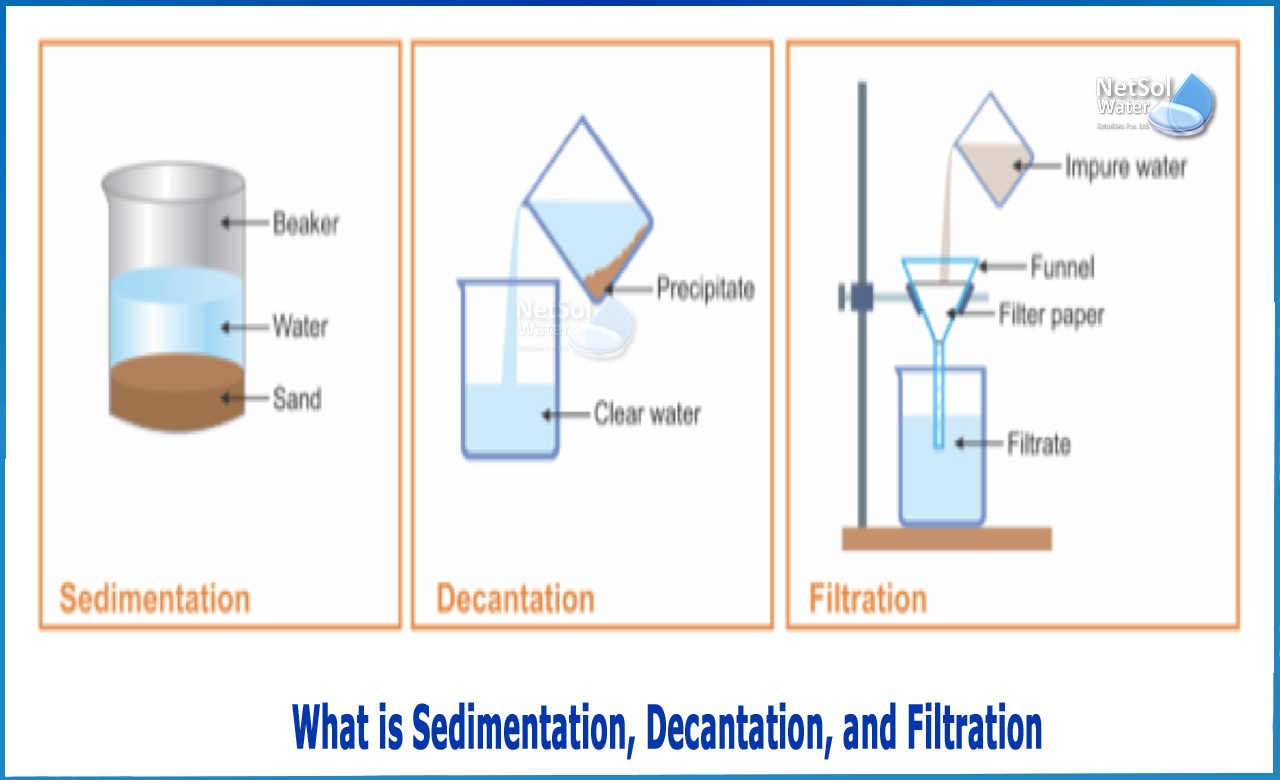What is sedimentation, decantation, and filtration?
Separation processes employed in our daily lives include sedimentation, decantation, and filtering. We can locate a combination of components, and to achieve a pure component, we must use a few purification and separation processes.
A: Sedimentation: Sedimentation is the process by which particles suspended in water/wastewater settle out of the suspension due to gravity. The particles that settle out of the suspension create sediment, which is referred to as sludge in wastewater treatment. Consolidation occurs when a heavy layer of silt continues to settle. Thickening occurs when mechanical measures are used to aid in the compaction of silt or sludge.
Sedimentation may be used in wastewater treatment to lower the concentration of particles in suspension before to coagulation, to minimize the quantity of coagulating chemicals required, or after coagulation and, perhaps, flocculation. When sedimentation is used after coagulation, the goal is generally to minimize the concentration of particles in suspension so that following filtering can work as efficiently as possible.
Sedimentation can be applied in a variety of ways, including horizontal flow, radial flow, inclined plate, ballasted floc, and floc blanket sedimentation.
B: Decantation: It is described as a separation procedure that separates two immiscible liquids. Pouring away the clear upper layer of liquid accomplishes this. Decantation is demonstrated by the separation of an oil-water combination.
Decantation involves leaving the mixture undisturbed for a period of time before pouring the liquid into another vessel without disturbing the sediments. With contrast, in filtration, the mixture is not left undisturbed for sediments to settle. The liquid is simply put into a receptacle and filtered with filter paper.
The premise is straightforward: sludge from a previous process step settles (sedimentation) and separates at the bottom of the settler, while pure water goes through.
C: Filtration: Filtration is a physical separation procedure that separates solid matter and fluid from a mixture by utilizing a filter media with a complicated structure that only allows the fluid to flow through. Oversized particles are solid particles that cannot pass through the filter media, and the fluid that goes through is referred to as the filtrate.
Oversized particles may create a filter cake on top of the filter and may also clog the filter lattice, preventing the fluid phase from passing through the filter, a process known as blinding. The size of the biggest particles that may effectively pass through a filter is referred to as the filter's effective pore size.
Filtration occurs in both natural and man-made systems, and it can take biological, geological, or industrial forms. Filtration also refers to biological and physical processes that remove chemical species and biological organisms from a fluid stream by entrainment, phagocytosis, adsorption, and absorption. Two examples are slow sand filters and trickling filters.
What do we offer?
If you are looking for the best wastewater treatment plants which includes sedimentation, decantation or filtration, then you are at the right place!
Netsol Water is Greater Noida-based leading water & wastewater treatment plant manufacturer. We are industry's most demanding company based on client review and work quality. We are known as best commercial RO plant manufacturers, industrial RO plant manufacturer, sewage treatment plant manufacturer, Water Softener Plant Manufacturers and effluent treatment plant manufacturers. Apart from this 24x7 customer support is our USP. Call on +91-9650608473, or write us at enquiry@netsolwater.com for any support, inquiry or product-purchase related query.



